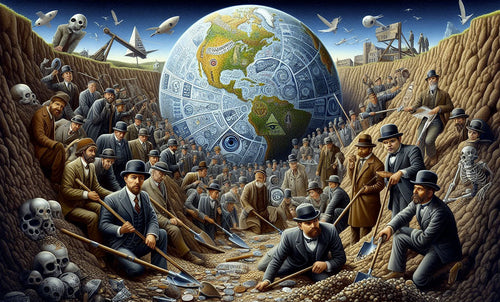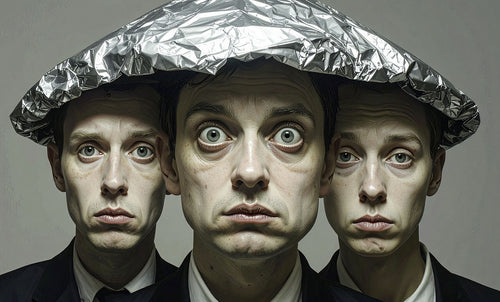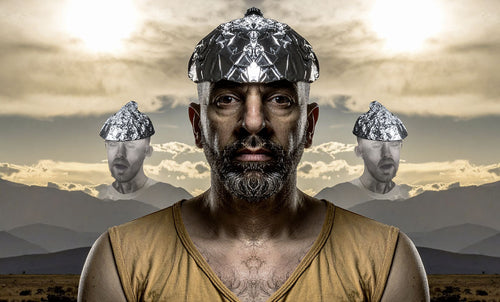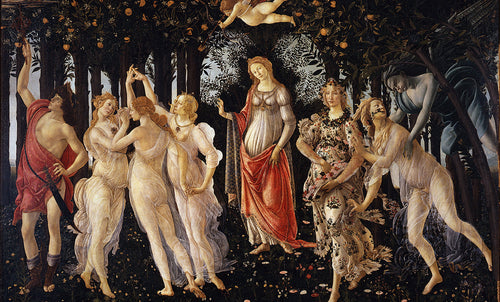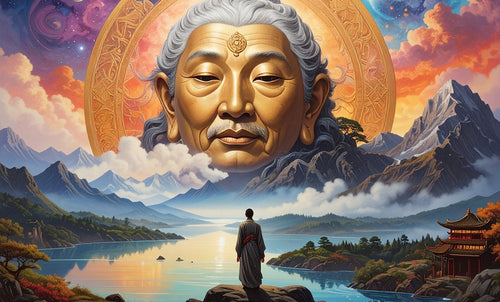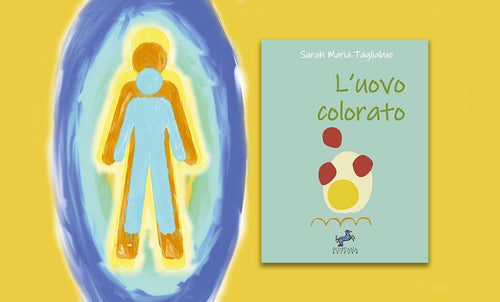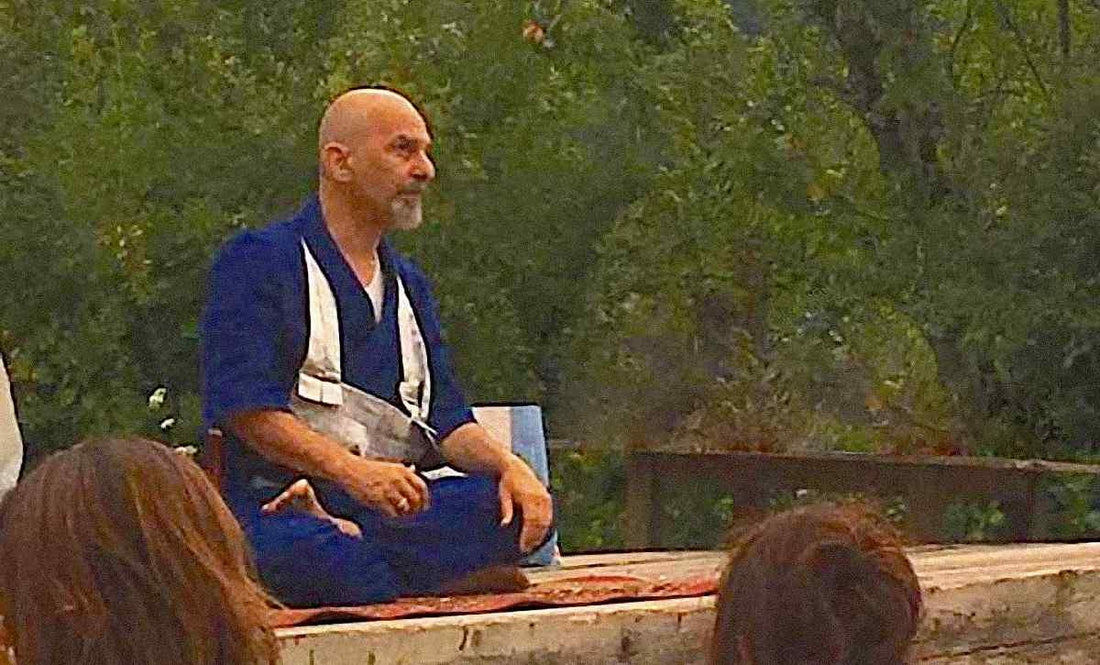
My child's disillusionment and the sun that rises in you from the silence
Rocco FontanaOn the occasion of my 60th Birthday – January 7, 2019 – I want to share these thoughts with you.
“...when the part of the door where the portrait was leaning was closed by chance, the Painter looked at it, and in a loud voice in amazement cried out, this is the hand of Titian! Gualdi pretended to laugh at it and said that if that were the case he would have been over 200 years old, adding that he was actually 86. And that was in the year 1677. The Painter was not appeased by this, but always asserted sternly that the work was by Titian. Meanwhile Gualdi confessed to being 86 years old, when he did not look more than 40 and was performing operations like a Man who is in the prime of his life” . From a biography of Federico Gualdi
And what did I know about how radios were made? I watched everything from the silence and everything was the world. And the world was me watching; do you remember it or do you still fear it, that memory?
This you/everything is scary.
No, it was not Freud's ID, it is not omnipotence and it is not hallucination but communion with everything; fragile, the child, because everywhere, he knows he is made of small universes, of atoms vibrating with eternal life.
This is where small is boundless.
Since I was a child I understood that men live with the liveliest idealism.
This ideality constitutes a world that overlaps with reality according to a protocol that we have learned from our parents and the world around us; many believe they are outside the bubble they invented, they believe that it is enough to be logical or have faith, but obviously this is not the case.
It is not a conspiracy, it has nothing to do with the elohim or the extraterrestrials; this matrix is easy to recognize but difficult to abandon. It is elusive, it seems to come and go like a mirage, but instead it is powerfully rooted in our habits of thought and feeling.
In this ideal sphere, fleeing, striking, hiding, being astonished, fainting, have always been typical reactions; from there it seems to most that one cannot or should not move. From the lowest tanner to the emperor, everyone seems to repeat these automatic reactions.
It seems to me, however, that this lively ideality by which humans live can, when conscious, help them, but more commonly drowns them, this ideality being a kind of psychic power that is too compressed but at the same time dispersed, pervading everything.
To be able to have this continuous projective force with us – and not against us – we must be able to see from outside this “idealizing force” that otherwise carries us around like sleepwalkers.
And from what neutral place could we see the whole true horizon of reality?
I cannot give you a “right-in-words” answer, but perhaps I can help you evoke it in yourself; I encourage the reader to a blissful challenge, since the answer is not easy and I myself was inspired by others, albeit through myself.
By listening to me, by reading me, you will do nothing but be more and more yourself, seeing in yourself that wider unexpected extension that has always awaited you.
Like a tree, I do not live by words but by experience, therefore, I am sorry, I am not superstitious, therefore I am not a scientist, I am not a positivist, I am not a reductionist, I am not a materialist, therefore I am not a transcendentalist, all stuff that is in fashion these centuries. As far as I am concerned, I do not feel like I am anything utterable, even if for the convenience of other humans, I proudly affirm that I am a Buddhist; if this suits me, it is thanks to the ferocious approach of this religious device towards illusion in all its possible and even most unexpected forms.
The essential meaning of Buddhism is the teaching of an unspeakable ferocity towards our hallucinations and justifications. Compassion comes later, first the dead must escape, and the “dead” is the “farce of ourselves”.
“Idealism” would be a particular philosophical approach that designates some ideal projection on the world, to the point that some very smart philosopher came to doubt the existence of an external objective reality. However, as far as I am really concerned, the philosopher would have doubted the existence of a-reality-external-to-MY-ideality-at-the-moment-that-I-read-or-listen-to-this-speech; I make this consideration because to begin to defeat this compulsive idealism one must really get personal.
This personal approach , instead of scaring or confusing me, made me have a doubt. But I am a Buddhist, so I make the doubt big, unbearable, divine; that doubt does not scratch your reality by making it ugly but, on the contrary, like a good tea, it broadens it, and sooner or later it makes it explicit in a eureka.
But the real, great doubt must be placed at the root of the experience, in silence and not in thought, because here every mental construct separates us from reality through an abstraction, just as the reductionist chemist separates himself convincingly and without even the slightest doubt, in the grip of his reifying materialism, who only wants formulas, and who can only see what has no body as "abstract" and therefore devoid of life.
It's just a matter of realizing the implications, and how we make silly equations between totally different qualities, thinking of them as quantities.
Idealism also involves the fact that while we talk about something, perhaps we are soaked in it, we are filled with it given the hypnosis of what we would like to say, like someone who talks about wine while already completely drunk and therefore unable to utter a single word and also smelling of wine, given that he has fallen into it; no different is the approach of the philosopher who while he speaks of the "principle of non-contradiction" in reality, is already looking at it from a non-contradictory respiratory-endocrine-sensory state without even realizing it. A sincere Buddhist senses these traps by instinct and does not want to fall into them.
We do not have to reach a supposed “Objectivity” neither in our explanation, nor in the paradigms of a supposed terminal knowledge, nor do we have a real need to abstract ourselves to see life better from the outside. Life itself; on the contrary we can find a genuineness that is already intrinsic to reality, to life.
But what are we talking about if we wave around verbal and verbose terms and nothing else?
As a boy I asked myself for a long time and with severity the question of whether I really expressed directly what I experienced, that is, directly from the experience itself. So experience > direct expression, where the direct input is the arrow, (even if it is ridiculous to say it like that).
Academically, we speak of German idealism, Italian idealism, that of Descartes, Berkeley, Hegel, or transcendental idealism.
“Strange these specializations,” I thought, “is it possible that there is a single man who is NOT imbued with idealism?”
Even for better or for worse, whether I am a slave to it or filled with it as pure and silent power.
If we want to jump out of it, we could foresee this liberation as a non-projective state, but a volitional one, precisely finalized and continuous, or something impossible and annoying for most. Few are dedicated to this and in some way they are special: they are the initiated or the awakened. They manage to penetrate this very thick fog that involves and upsets even the DNA, and they usually manage to do it in secret, if only to avoid exposing themselves to the malignant influence of collective impotence, to the devastating matrix of a horizontal, idealized and masturbatory explanation of the world that always returns to itself, to the collective need to which it responds and that it generates, at the same time.
It is very interesting to note how there is a contradiction between the colloquial use of the word idealist and the idea of idealism in philosophy.
I do not pretend to go into the depths of academic philosophy, let us just try to define this lexical contradiction.
The idealist commonly understood is a guy with his head in the clouds, perhaps adorable; I don't know, a patriot, a missionary, a researcher in quantum physics, a trade unionist of the nineteenth century. Instead the philosopher of idealism would be in reality - according to academic philosophy - a scholar with his small round glasses who already in the eighteenth century, had a doubt about reality, who then, going forward in the centuries, taking off the already smaller and without lace ruff, adding tobacco and coffee, becomes an illuminist, that is with a high and stiff shirt collar.
Being a little more nervous, he wrote a tractatus defining what he is experiencing in real time with a seemingly more orderly exposition of thought.
Apparently.
In reality, abstraction-as-a-profession is taking shape.
Will he have noticed?
But what really matters to my heart as a thinker-without-noise, that is, as a Buddhist, is that he had a huge doubt: “maybe reality doesn’t even exist,” and you’re saying little, “or it doesn’t exist exactly as we imagined it.” We called this idealism because they threw it into the basket of human inventions; in this basket are also immanentism + positivism + existentialism… Buddhism – allow me to joke about it – because the reckless motorcyclists of science arrived, dressed in leather and studs, stained with nicotine, as well as armed with chains of syllogisms and bottles of beer. The scientist hell drivers began to impose the belief – according to them objective – that a table was really a table in the neurological-chemical sense (not mental-inter/relational-metaphysical) and for this reason they leaned their muddy boots on it. Translation of “table” in Illuminatese: "the table... is a table 'apart from' that is, external to my mental activity which, in fact, is here reduced to the cerebral one. Therefore to impotence". Did I forget something?
So, away with the fideistic hooligans, for whom everything is part of the great plan of salvation and therefore is excellent and abundant - as was said of the military ration - as well as dotted (signa) with various truths demonstrable only by dogmas - leaving a nice void of experiential gnosis and every map of experience torn up - here come the scientistic hell's angels, those of the truths demonstrable only by the theory now in vogue, who are the mechanical and slobbering continuation of the hooligans. Nothing new under the sun.
A question arises: who will be the next drunken sailors who will come to bother us? Of course I say this with affection. After all, no one can say anything to these hooligans and hell's angels because they have both invented ad hoc systems of thought: immovable, appropriate to the period, therefore convincing to the thousandth for the poor in spirit, because very precise in their angelology and paraphernalia. The knee on the kneeler, the eye in the microscope.
As if to say, you go into a tobacconist's not to buy a bicycle or some ham, but because you know that a pack of cigarettes, or a bus ticket, or some table salt are already waiting for you. Are you crazy?
The end. Period. Don't even try it.
The question that underlies the so-called cre-di-bi-li-ty is and remains: is what you have discovered part of the great usual description in vogue these days?
If the answer is no, what you have seen and what you can demonstrate is not valid for the masses.
I spoke to brilliant chemists and physicists who expressed their point of view to me; they tried to explain to their colleagues that the particle accelerator was useless, that they already knew the answer; in reality, even their colleagues almost realized that the God particle was something without much sense or, better, an attempt, but that it was an attempt worth millions and millions of euros. Then, you know, in the meantime people get excited, popularizers have orgasms and mass scientist hypnosis grinds; science must progress, after all, failures don't exist, right?
A man penetrated, at the beginning of the twentieth century, the scientific materialist world with a truly embarrassing question: “Certain things do not exist? Precisely… Which 'certain things'? ...But, have you ever considered the clear and undeniable cases of poltergeists?” .
This genius was Charlie Dunbar Broad. Sociologist, perhaps anthropologist unknown to most, obviously.
The question is simple and concerns the unleashing of latent, but clearly manifest, psychic forces that come from human beings, usually adolescents. Entire rooms turned upside down in front of the frightened family; tables and chairs that rise and gravitate around the room, voices, extraneous noises, easily detectable tactile presences and so on.
But Prof. Broad was a man who said things bluntly, without second thoughts; at that time he came out, he defined himself as homosexual in public, in the same historical period in which Oscar Wilde was imprisoned for the same reason.
This is what I would call “gay pride.”
But he also had an uncontainable human pride and I thank him from the bottom of my heart.
Around the same time, a certain Arthur Conan Doyle invented an equally “certain” Sherlock Holmes, certain that he could contain everything in his very precisely materialistic or chemical-physical investigations, during which he mocked all the metaphysical nonsense that his enemies continually invented.
But one day Conan Doyle changed his mind because he was a true possibilist so he didn't feel bad. He accepted reality.
This led to an intense exchange of letters with Count Mattei, the first founder of a multinational pharmaceutical company that was – surprise! – homeopathic, or rather electro-homeopathic, which produced remedies of shocking power, and a friendship with a rather famous hypnotist, Alexander Erskine, who one day included him in one of his experiments.
Erskine chose an easily hypnotizable subject, a teenage boy, therefore of poltergeist age. The father was a certain Jack Mardell, an officer of the Portuguese legation in London; in the meantime he had gone to run some errands, while what Erskine did was to hypnotize the boy and ask him in detail, in real time, where his father was going and what he was doing. The story was very precise since the boy was able to recognize every street, the street number, the type of shop or office and even the faces of the people involved.
The father returned and was asked where he had gone. They found that every piece of data corresponded to the minute, and towards the end of the story, they themselves told what was written, to the great astonishment of the father, who read all the notes and was astonished. Another time Erskine had one of his patients describe under hypnosis, Conan Doyle present, the house where, at that moment, the writer's wife was, defining the furniture, the tea sets, the dress she was wearing, the colors of the upholstery and even the most minute momentary details, such as gestures and movements.
As a child, I saw almost immediately that adults weren't joking.
At first I thought they were acting; it seemed incredible to me that big, tall people could be lost in their thoughts about intuitions that for me were obvious, innate, evident. Open like my gaze. Nothing more.
They got angry and then, if they didn't faint purple, maybe they calmed down. They ran here and there, they suddenly softened, they talked to you as if you were an idiot, they went away and then came back, and all this with an intensity full of faith, as if there were always a drunken tomorrow waiting for your emotions with an ocean of applause, a standing ovation just for you, equipped with hostesses throwing flowers and little girls scattering a carpet of rose petals. It's just that all this hopeful and consuming waiting - Lao Tse called it an immobile stamping of feet - didn't seem sensible to me in a sphere of existence where the end was present.
I didn't know anything about philosophy at four years old, imagine that, and on some points I was confused, I swear I thought that on the radio there were little ants that spoke and sang; but I had to point out to the adults that death existed, not as a philosophical or depressive/religious fact, but as a FACT that has - by the Gods! - inevitable CONSEQUENCES.
Understanding the vastness of death changes the quality of our life IMMEDIATELY. I didn't say fear or explanations, I said death.
There's no point in making excuses, you can only pretend to forget about it.
The exact phrase was: “Why do you run if you have to die?”
My mother apologized to those present and, caressing me, said: “What an intelligent child, what a profound child! What a sensitive child”.
I thought , “Whoa! He got off lightly!”
But I appreciated the caresses a lot.
The death I perceived had no philosophical explanation. It was not sensible for me to think useless things like “everything ends” or “something continues”, because for me everything , nothing and something were in the same look.
Death, I understood immediately at the age of four, does not even have a "legal" meaning, it is not inflicted as a punishment. It is there and that's it, it is there because yes, and the whole universe responds to it harmoniously, without interruption, because everything responds to everything and only the stupid believe (note the verb) that there is an explanation for this. I had already understood this because I could clearly see how death and life did not have a defined meaning in themselves, precisely because what we could talk about would, in reality, only be a WORD.
Life = blah. Death = blah.
Find me a difference that is not just an inference, that is, an interval between the true experience and the deferred description of the same.
For the Etruscans the verb to die and the verb to be born were the same: sval .
The death that could be spoken of among humans was imbued with feeling, logic, hope or avoidance of hope if not feeling or logic, or at the same time all of these, in any case it was full of all that stuff that is NOT naked and direct experience but abstract elaboration of every kind, of the same type that current scientific superstition deems objective. Just say that it is useful to you, if it is, but before believing that it is objective, at least study Zeno, Parmenides, Heraclitus. Nagarjuna. Heidegger. Enter into the mystery, at least the one contained in books, otherwise you will always resemble yourself to bask in the certainties of the inwardly-illiterate-but-outwardly-graduate.
And we still wonder what the point of philosophy is when science can explain everything.
But it is that we are living knowledge, our experience is living knowledge, GNOSIS.
This is why the Masters of the past said the exact same things and created traps and paradoxes to make you jump out and not, as the academic humanists believe, to explain the world to us. This is their idea, not that of the ancients, and today, little by little, we are realizing it. Even after Buddhism came to the West we are starting to understand the pre-Socratics... and where did we put them before, poor things?
That cloud that can be defined as ideality must be understood from a place where such a drive cannot reach and that cannot contaminate. Deprived of that uncontaminated place, of this bliss, sooner or later they will invent pills to return to bliss. It is because of such an extreme distrust towards life that, in fact, those pills have already been invented and are already on sale. Even intravenously, you don't even have to go to the dealer, it is enough that you are sick of mistake, that you are lost, which for materialists means that this is neurological and therefore FOREVER.
A damnatio memoriae, but one that is inside, that awaits you inside.
The magma unconscious – a reinvention of the devil – that Freud invented to found a new priesthood, if it catches you and possesses you, makes every further instance physiological. Then you will have to pull that cart like a donkey.
Whoever wakes up can discover his child identity, completely asexual and ageless, which fades more and more into the non-identity/eternal-identity, preverbal, without-a-single-idea-that-it-is-one but wide open to everything.
This is how you understand what kind of shit they/you have wrapped yourself up in.
And then choose to be as you really want to be, or as it suits you to be with the burdens you carry with you, which is fine just the same because you will certainly not fail to live in any case, thus resolving yourself in any case.
Idealism in itself would thus seem to be a disease, which could however be the beginning of the cure, but only if an unexpected leap occurs that leads from ideas to the naked, blissfully murderous experience of vagueness in a detonating experience of silence-while-living.
Meditate.
Why would I be so sure? Because you can give me the definition of anything, but if you fail to maneuver in time while you're driving and someone suddenly pops out, you're going to dent your fender.
Would you ever want to dent the fender? Surely not at the level of your surface consciousness. But according to your extended and interactive consciousness, yes, in fact you succeeded.
Especially because probably - forgive me this banal guilt-inducing outburst - you were talking nonsense in your mind instead of paying attention to driving, and this is already in itself a confession of impotence, even if it is incipient to the discovery of a mystery... If only at least at the moment of impact you were silent and saw THE reality.
When you begin to feel the symptom, if you will, you are close to the cure, as when spring is near because winter is at the door.
You are almost there now, if you will go into meditation, if you will go into great doubt.
A Taoist from thousands of years ago, without mincing words or superstition, could explain it to you well: “I lost the use of my leg because I was not able to keep it, not because I fell and hurt myself…”.
Otherwise it would be too easy. But we cannot stand this fact, because it seems guilt-ridden and anti-democratic. We are on the side of the Pharisees who, clever!, asked Christ if that child was blind because of his parents or his own!
Jesus could not answer complicated things since they would have been used against him but he could only say "neither his nor his parents'"; because guilt, ANYWAY, would have had to be spoken of.
He who cannot think (cannot return to silence) chooses a paradigm and revolves around it, and claims that as the alpha & omega of every discourse; in fact he only knows how to make discourses and would never want to return to the non-paradigm, to the assassin of every idealism, to the center of every idealism, to the killing silence.
From that silence Epictetus, who was lame, said “being lame is a hindrance to the leg, but not to the state of mind” and he said it not on the basis of hope, but of clear experience.
In meditation, a snowy silence overwhelms us; I have experienced this in meditation and in the presence of my Masters and probably we share the same effect practicing together you and I. All of us One. The whole Universe One. One equals Zero equals Infinity equals every Number. This is deep meditation.
The point is that that silence awaits us while, on the contrary, for the noise of conceptions and ideals we must want to lose the silence in which we lived as children, during which we could even shout or talk for hours without ever losing it and without ever losing ourselves in anything; children while playing, because of that ancestral silence, would not dream at all in a state of eidetic projection on reality, in reality they are projecting reality in (not "on") reality. All this because of silence and playing; not of the toy itself or of the reading of the usual psychiatricizing academics.
The child is feared by science and watched closely.
He was feared, as well as bent, by Christianity despite the words of Christ. Children are the first to be hit by the most obvious and crude theories of adult idealism. And so it remains true that children are unfathomable. Not usable for the purposes of a bla-understanding of bla-reality.
“Ants inside the radio… Come on! What an innocent, poor idiot…”.
Even if educated and inclusive, democratic or left-wing, you can recognize someone who thinks so materialistically from tens of meters away; his head is cubic, even if it appears rounded.
For him, everything is a papier-mâché scenario, nothing is alive but only an external “thing”, an exhaustive and all-encompassing formula; an every-thing slave to a flattening, two-dimensional Monday morning, commented on live and incessantly.
The final and poisonous moment of scientific idealism takes up the Christian one: a sacrament must be given so that someone is saved and stops being afraid, since he would not have been able to trust life itself anyway.
Faced with the ideal of such scientific/salvific grandeur, nothing will be able to stop them, and all those who stand in their way will be exorcised, anathematized and exterminated.
But this must not be known, it is too scary, ideology is still considered a useful tool of life; "positive" because it is projective and therefore indicates a path of hope. Values.
And be it, after all, the contraction does not allow one to see; this is what the updated case history of adverse reactions tells us, both those that are overt and those that are not recognized, plus those that are chronic and therefore not detectable as they are time bombs in the existence of individuals. A collective death drive that in other times translated into cannon shots.
Thus the memory of the primordial, of the physical or spiritual health already alive and already powerfully capable of organizing itself, can be lost; the evocation of what most shows us this fall is precisely our immune power that attacks those who live by it.
The wise men never understood how that restored power could be recovered.
So: is magic the great secret of life and being? Is this the hidden place of every potential and every power capable of redeeming us?
Is he right who glimpses the beginning of things and who, by acting upon it in a way that everyone says is impossible, succeeds in accomplishing the impossible?
Or is it another tool that can fall into the hands of more drunken sailors?
There is no point in playing God if you are already God and look through his eternal eye; but you “only” have to understand how to realize him in the Uni-Verse instead of mimicking him with faith, with scientific theories or with magical powers.
Reality in reality is the joy of the eternal child, bliss and living recognition.
The escape from this oceanic paradise is all the behaviors of those who are only afraid. How can one say that this poor man has knowledge or conscience? How can one say that he thinks, this man, if the sun does not rise from the morning silence?
The enlightened one is not perfect but he sees reality even when he is wrong or says stupid things.
It's that every morning the Sun rises from the silence, we can do nothing against it; finally we can no longer forget it, it's ridiculous to say it like that but we have to say something. Enlightenment is the awakening that then explodes inside us but that is everywhere and always.
By meditating, you open your senses to the everywhere of the evening; do not waste time, learn to cross your legs and go into the absorption that makes you everything. Ask yourself - who else? - for the eternity that is given to you at birth but that humans forget...
After the absorption and the explosion, finally, if we live this again and again, we can speak of hydrogen, of astronomy, of mescalite or entropy, of Apollo or of Philosophical Mercury, if not of adamantine lightning, of Intelligent Spirit and of Gods, of satori or of the Eucharist.
It no longer makes any difference, or rather, they are only joyful differences, because the idea has found its ubiquitous, oceanic non-root. No one needs in himself a homo sapiens, religiosus or scientificus, but a real human being who is ourselves.
You can only get moving and meet those who, like you, want to be real; my “job” is to encourage you and meditate together with those who want to meet that Us, Us, which has been such since time without beginning while we walk, sit, sleep, love. This Us Ourselves that are everywhere and in every time, being knowledge, faith, magic and source gnosis, This awaits you here.
Remember and remember again, to remember it again.
All the power of this choice is with you now, affirm it now in your silent meditation. It is here and it is listening.
It is your silent meditation that is NOW writing and reading these words.
Learn or deepen YOUR meditation.
The appointments are on Facebook:

